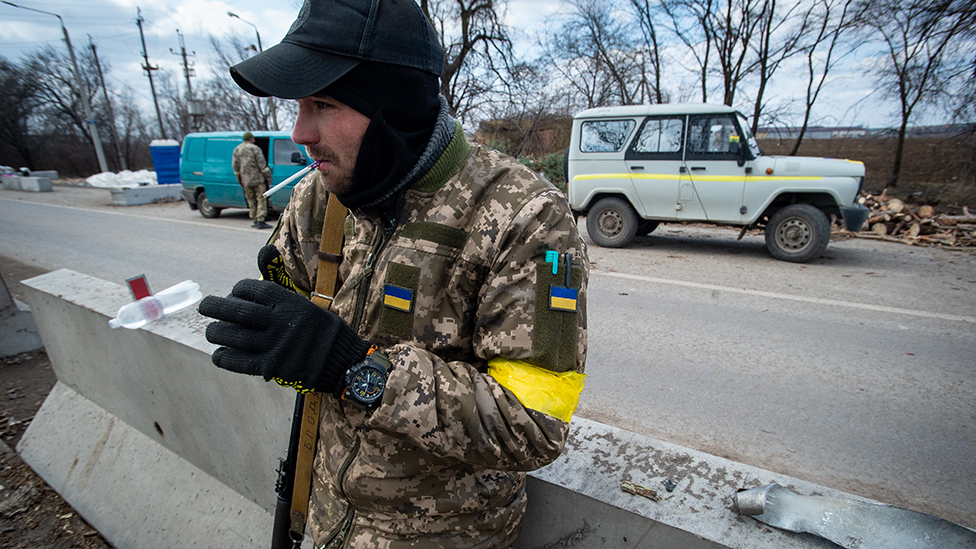
### UK Government Unveils Sanctions on Russian Troops for the Use of Chemical Weapons in Ukraine
In a noteworthy effort to address the employment of chemical weapons in conflict, the UK government has unveiled sanctions against Russian troops following their participation in the deployment of chemical weapons in the Ukrainian theater of war. These sanctions, revealed on 8 October, focus on the Russian Radiological, Chemical, and Biological Defence Troops, along with their commander, Igor Kirillov, and two subordinate labs operating under their authority.
#### Admission of Chemical Weapons Utilization
The UK government referenced acknowledgments from Russian forces regarding their use of dangerous chemical agents, notably the frequently mentioned deployment of riot control agents and **chloropicrin**—a potent irritant and choking agent first recognized in the 1840s. Numerous reports over recent months have linked Russian forces to the use of these harmful substances, violating international law. While initially created as a pesticide, chloropicrin can have catastrophic effects when weaponized, inflicting severe discomfort and respiratory injury on those exposed.
A barrage of accusations against Russia for its chemical warfare methods has elicited rapid international rebuke, prompting both the UK and the United States to impose considerable diplomatic and economic repercussions on the responsible parties.
#### UK Representative Urges Adherence to International Standards
In a declaration before the **Organisation for the Prohibition of Chemical Weapons (OPCW)**, Joanna Roper, the UK Permanent Representative to the OPCW, urged Russia to stop employing these “appalling weapons” and to fulfill its responsibilities under the **Chemical Weapons Convention (CWC)**. Roper underscored the UK’s unwavering commitment to holding accountable those who utilize such inhumane tactics in warfare. She pointed out Russia’s infringement of international agreements that forbid the use of chemical agents in armed conflict, including toxic substances intended to cause injury or death.
“We urge Russia to immediately halt the use of these dreadful weapons and to comply with its obligations under the Chemical Weapons Convention,” stated Roper.
#### Economic and Diplomatic Repercussions
The sanctions enacted by the UK are directed at Russia’s **Radiological, Chemical, and Biological Defence Troops** and their hierarchy. These forces have been involved in acts of chemical warfare in Ukraine, which contravene international laws outlined by the CWC. The sanctions encompass:
– **Asset Freezes**: Assets belonging to the implicated individuals and entities within UK jurisdiction are frozen, restricting Russia’s capacity to finance these activities.
– **Travel Ban**: Individuals affected by the sanctions are prohibited from entering the UK.
These measures respond to Russia’s disruptive activities in Ukraine, which threaten the region’s territorial integrity, sovereignty, and independence. The overarching aim is to compel Russia to rethink its ongoing aggressive strategies and to foster diplomatic endeavors for restoring peace and accountability.
#### Global Reaction and Financial Aid for OPCW
In tandem with the sanctions, the UK government has reaffirmed its dedication to the global fight against chemical warfare by contributing **£650,000** voluntarily to the OPCW. This funding bolsters the OPCW’s continuous efforts to verify allegations of chemical weapons usage and provide protection and support to those impacted.
A portion of this contribution will be allocated for assistance in **Ukraine**, where chemical weapon assaults have affected both military and civilian targets. The funding will also aid OPCW operations in **Syria**, another region accused of chemical weapons deployment, and support advanced projects, including **artificial intelligence** initiatives designed to enhance detection and protective technologies against chemical weapons.
The UK’s financial commitment underscores the vital importance of international collaboration in combating the proliferation and application of chemical weaponry across conflict areas.
#### Widespread Global Condemnation
The UK’s position is in alignment with that of other international powers, with the **United States Department of State** expressing its disapproval of Russia’s actions regarding chemical weapons. In May 2024, it implemented additional measures, explicitly identifying chloropicrin as one of the chemical agents used by Russian troops in Ukraine. Despite a declaration from the **OPCW** in May 2024 asserting a lack of sufficient evidence regarding claims of riot control agents like tear gas, other reports of chemical warfare have continued, prompting this strong diplomatic action.
The international community remains profoundly alarmed by Russia’s alleged employment of chemical agents, which pose lethal risks in combat, especially against defenseless infantry units or civilian populations. The tactical utilization of such materials not only violates the CWC but also undermines the moral and humanitarian principles upheld by the modern framework of international law.
#### Upholding the Chemical Weapons Convention
The **Chemical Weapons Convention** (CWC) is a pivotal treaty endorsed by 193 nations, including Russia, aimed at abolishing the development, manufacturing, acquisition, and usage of chemical weapons. According to the CWC, any toxic chemicals intended to inflict harm or death are classified as chemical weapons and are strictly banned. CWC signatories are also required to report any chemical agents held for riot control purposes and impose stringent limitations.